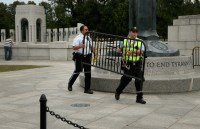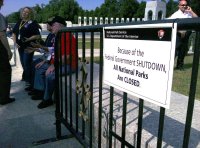UPDATE: The National Park Service allowed World War II veterans to visit their memorial on the National Mall Wednesday despite the government shutdown.
The decision — the park service said their visits now constitute protected “First Amendment activity” — came as hundreds of veterans in their 80s and 90s from Kansas and Missouri defied federal orders that the site was closed Wednesday morning and visited it, anyway.
The decision marked a 180-degree turn from park-service guidance Monday declaring that the open-air memorial would be closed during the shutdown.
Washington politicians may have the time to debate how to fund the government, now that their pig-headedness has shut it down, but the nation’s World War II veterans don’t.
“World War II veterans are dying by the hundreds every day,” says Fred Yanow, of Northbrook, Ill., who spent 1942-45 in the Pacific theater as an Army private. “It’s a shame that they don’t care about World War II veterans when so many of them are dying off.” The 16 million men and women who wore their nation’s uniform in the so-called “Good War,” from 1941 to 1945, are leaving for eternal R&R at the rate of 650 a day.
Yet politicians also can sense bad PR a mile away, and erecting barricades to keep wheelchair-bound vets away from a memorial honoring their sacrifice doesn’t pass the smell test. By late Tuesday, GOP lawmakers tried — and failed — to formally re-open war memorials that had been closed only hours earlier because of the government shutdown. As Tuesday’s charade made clear to even the most self-righteous solon, shutting the memorial to the elderly heroes it was built to honor is a political non-starter.
For the troops that fought at Anzio, Normandy and Okinawa in their teens, storming the World War II Memorial in their 80s and 90s — against National Park police officers who seemed pre-emptively to wave white flags — was a piece of cake.
Yanow plans to fly via a free (to him) Honor Flight from Chicago to Washington, D.C., on Wednesday to visit the World War II memorial, even if it remains barricaded and his visit may be limited to a drive-by.
“Because of the federal government shutdown,” the National Park Service’s World War II Memorial website said Tuesday, “all national parks are closed and National Park Service webpages are not operating.” Yanow retains a GI’s scorn for those in charge. “It’s a disgrace to shut down the memorial,” he says. “The government is working for themselves, and not for the public.”

Manning the barricades: Park Service police moving barriers into place to keep veterans at bay.
Veterans have been stacked up for months on Honor Flight rosters, awaiting their chance to visit the memorial. When you get to be their age, there’s never a good time to put off a visit. “They’re in their mid-80s to 90s, and this is the only opportunity they’re ever going to have to be able to see that memorial,” says Diane Gresse, Honor Flight’s executive director. “Most of these men and women have been on a waiting list for one or two years, sometimes longer.”
“Time is of the essence,” Honor Flight makes clear on its website. Gresse sums it up more poignantly: “A lot of these veterans,” she says, “hang on until they can experience an Honor Flight trip.”
Nearly 1,000 are due in on Honor Flights though Sunday, with a total of 4,300 slated to visit the World War II memorial before the Honor Flight’s flying season ends just before Thanksgiving. “There’s a lot of difference between closing down a zoo,” Gresse says, “and telling a veteran that he is going to be locked out of his or her memorial.”
With reinforcements provided by local congressmen, some 200 vets from Iowa and Mississippi were permitted to visit the memorial Tuesday after the Park Service declared that wouldn’t be possible. “We have been getting quite a few calls from honor flights and have had to let them know that the memorial will be closed and the fountain will be off, that the Mall is legally closed,” Park Service spokeswoman Carol Bradley Johnson said in the Washington Post’s Tuesday edition. “So, unfortunately, they won’t be able to access the memorial.”
That went over like a lead zeppelin, and was quickly repudiated by the very lawmakers whose actions triggered the memorial’s shutdown. Veterans, some accompanied by their local lawmakers, pushed through metal barriers when they arrived for their late-morning visit, slowly surging into the plaza-like memorial. “It’s the best civil disobedience we’ve seen in Washington for a long time,” Rep. Bill Huizenga, R-Mich., told them.
Back on Capitol Hill, those who played a key role in the shutdown wiped culpability from their hands. “I know that today we have Honor Flight veterans flying into Washington to come and enjoy the memorials here,” House Majority Leader Eric Cantor, R-Va., said. “I’m told that they are at the World War II Memorial site, regardless of the barriers, because they should, as Americans, as veterans, people who’ve served this country, have the ability to enjoy that site.” He blamed Democrats’ “silliness” for the shutdown, citing their refusal to sit down and negotiate.
But Yanow, a self-described Democrat, says he and the dozen pals he regularly joins for breakfast blame the Republicans for the standoff, and the resulting memorial shutdown. “The Congress seems to want to shut down everything that our President wants,” he says. “I don’t know if that’s because he’s black, or because he’s a Democrat.”
But not all vets shared Yanow’s perspective. “The main question is, how do we stop spending?” asked Norman Rudi from Iowa, another Army veteran of World War II action in the Pacific. “An attempt to close all the national monuments that belong to the American people is purely a ruse by the President to say, ‘Hey, get on my side.’ And he’s absolutely wrong.”

Mississippi veterans defy the barricades designed to keep them outside their World War II Memorial.
The federal government’s shutdown closed the nation’s monuments and memorials around the country, including the gleaming metal and stone edifices erected to honor Jefferson, Lincoln, Franklin D. Roosevelt and the Greatest Generation that fought World War II. Their memorial, between the Washington Monument and Lincoln Memorial, opened in 2004. A year later, thousands of veterans began taking free trips to the capital, funded by donations, to visit their memorial.
Many are old and infirm, but they generate sustained applause from everyday passengers when they arrive at one of the capital region’s three airports. They board buses for the trek to the National Mall, where they visit their memorial to commemorate their youth, and those no longer alive, or capable of making the trip. If the vets come from east of the Mississippi River, they generally return home the same day; westerners stay an extra day or two.
Yanow, who turns 90 next Monday, sums up the snafu with a soldier’s simple statement. “It’s a foolish thing,” he says, almost wistfully, “to deprive World War II veterans of their memorial.”
— With reporting by Katy Steinmetz and Denver Nicks


